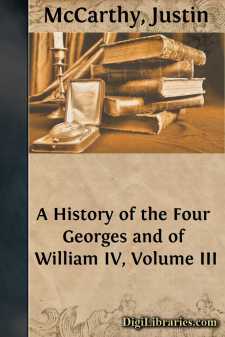Categories
- Antiques & Collectibles 13
- Architecture 36
- Art 48
- Bibles 22
- Biography & Autobiography 813
- Body, Mind & Spirit 142
- Business & Economics 28
- Children's Books 15
- Children's Fiction 12
- Computers 4
- Cooking 94
- Crafts & Hobbies 4
- Drama 346
- Education 46
- Family & Relationships 57
- Fiction 11828
- Games 19
- Gardening 17
- Health & Fitness 34
- History 1377
- House & Home 1
- Humor 147
- Juvenile Fiction 1873
- Juvenile Nonfiction 202
- Language Arts & Disciplines 88
- Law 16
- Literary Collections 686
- Literary Criticism 179
- Mathematics 13
- Medical 41
- Music 40
- Nature 179
- Non-Classifiable 1768
- Performing Arts 7
- Periodicals 1453
- Philosophy 64
- Photography 2
- Poetry 896
- Political Science 203
- Psychology 42
- Reference 154
- Religion 513
- Science 126
- Self-Help 84
- Social Science 81
- Sports & Recreation 34
- Study Aids 3
- Technology & Engineering 59
- Transportation 23
- Travel 463
- True Crime 29
A History of the Four Georges, Volume II
by: Justin McCarthy
Description:
Excerpt
BOLINGBROKE ROUTED AGAIN.
While "the King's friends" and the Patriots, otherwise the Court party and the country party, were speech-making and pamphleteering, one of the greatest English pamphleteers, who was also one of the masters of English fiction, passed quietly out of existence. On April 24, 1731, Daniel Defoe died. It does not belong to the business of this history to narrate the life or describe the works of Defoe. The book on which his fame will chiefly rest was published just twenty years before his death. "Robinson Crusoe" first thrilled the world in 1719. "Robinson Crusoe" has a place in literature as unassailable as "Gulliver's Travels" or as "Don Quixote." Rousseau in his "Émile" declares that "Robinson Crusoe" should for a long time be his pupil's sole library, and that it would ever after through life be to him one of his dearest intellectual companions. At the present time, it is said, English school-boys do not read "Robinson Crusoe." There are laws of literary reaction in the tastes of school-boys as of older people. There were days when the English public did not read Shakespeare; but it was certain that Shakespeare would come up again, and it is certain that "Robinson Crusoe" will come up again. Defoe had been {2} a fierce fighter in the political literature of his time, and that was a trying time for the political gladiator. He had, according to his own declaration, been thirteen times rich and thirteen times poor. He had always written according to his convictions, and he had a spirit that no enemy could cow, and that no persecution could break. He had had the most wonderful ups and downs of fortune. He had been patronized by sovereigns and persecuted by statesmen. He had been fined; he had been pensioned; he had been sent on political missions by one minister, and he had been clapped into Newgate by another. He had been applauded in the streets and he had been hooted in the pillory. Had he not written "Robinson Crusoe" he would still have held a high place in English literature, because of the other romances that came from his teeming brain, and because of the political tracts that made so deep and lasting an impression even in that age of famous political tracts. But "Robinson Crusoe" is to his other works like Aaron's serpent, or the "one master-passion in the breast," which the poet has compared with it—it "swallows all the rest." "While all ages and descriptions of people," says Charles Lamb, "hang delighted over the adventures of Robinson Crusoe, and will continue to do so, we trust, while the world lasts, how few comparatively will bear to be told that there exist other fictitious narratives by the same writer—four of them at least of no inferior interest, except what results from a less felicitous choice of situation. 'Roxana,' 'Singleton,' 'Moll Flanders,' 'Colonel Jack,' are all genuine offsprings of the same father. They bear the veritable impress of Defoe. Even an unpractised midwife would swear to the nose, lip, forehead, and eye of every one of them....







